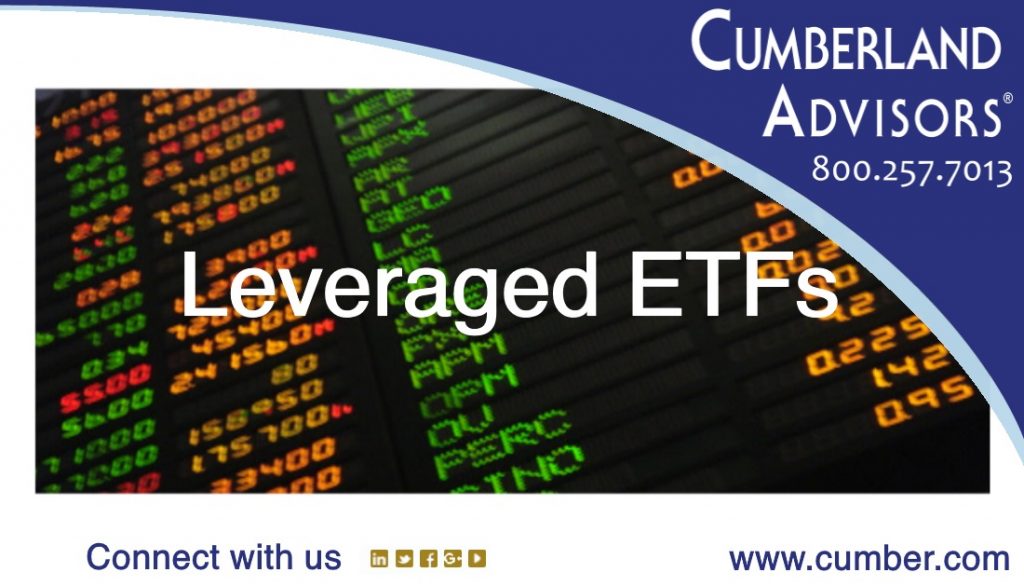Our quantitative strategy at Cumberland Advisors is a trading model that combines fundamental indicators and quantitative analysis into a binary output – either fully invested or all in cash. The strategy trades the S&P 500 in two versions: unleveraged and leveraged. Specifically, the leveraged portfolio uses a leveraged ETF as our vehicle to track 3X the market movement. As many may wonder whether one should use a leveraged ETF, we would like to express our opinions on leveraged ETFs today.

First, what is a leveraged ETF? It is simply an ETF using derivatives and debt to track and amplify the return of an index. However, a leveraged ETF does not expose investors to traditional margin risk; rather, investors just pay the ETF cost. A leveraged ETF resets each day and targets to track an index’s daily movement. A leveraged ETF is usually considered a trading tool. It is typically held for less than a week at most, and oftentimes just daily. Investors are generally told not to buy and hold this type of security due to “time decay,” a term that is often misused when applied to leveraged ETFs. Time decay is a term used to describe the loss of value of an option as time approaches the expiration date. However, leveraged ETFs are not subject to option expirations. What “time decay” really refers to, in connection with leveraged ETFs, is the compounding effect. For example, if the market went up 10% on day 1 and went down 10% on day 2, one would lose 1% at the end of day 2; with 3X leverage, one would go up 30% on day 1 and down 30% on day 2, being left with a 9% loss at the end:
1 - (1+0.1) x (1-0.1) = 0.01 (1)
1 - (1+0.3) x (1-0.3) = 0.09 (2)
Time has nothing to do with the math above. It is compounding that magnifies the leveraged number. In other words, anything that increased 30% and then decreased 30% would have the same outcome regardless of leverage. Imagine that equation (2) represented a scenario where the market went up 30% on day 1 and down 30% on day 2 – one would be left with 9% loss without any leverage or so-called “time decay” effect. Another example: If the market dropped 1% a day for 10 consecutive days, one would suffer a 9.56% loss, while the loss would be 26.26% with 3X leverage:
1 - (1-0.01)10 ≈ 0.0956 (3)
1 - (1-0.03)10 ≈ 0.2626 (4)
Again, the math demonstrates that time is not the reason for the significant difference; compounded return is the master behind the scene. To understand the power of compounding, let’s take a look at a famous motivational poster that some people have as their desktop – if you improve just 1% a day, you will be much better in a year:


Chart 2. S&P 500 vs. SPXL, 11/5/2008–11/9/2018. Data source: Bloomberg
Clearly, the 3X ETF has substantially outperformed the S&P 500 since its inception on November 5, 2008. However, not every investor would have had the stomach for the volatility that was experienced along the way. Leverage can be a powerful tool to take advantage of a bull market if used properly, but one must possess extensive risk management skills. At Cumberland Advisors, we prioritize risk control by keeping our focus on risk-adjusted returns.
If you are interested in obtaining information about our quantitative strategy, please email me.
Leo Chen, Ph.D.
Portfolio Manager & Quantitative Strategist
Email | Bio
Links to other websites or electronic media controlled or offered by Third-Parties (non-affiliates of Cumberland Advisors) are provided only as a reference and courtesy to our users. Cumberland Advisors has no control over such websites, does not recommend or endorse any opinions, ideas, products, information, or content of such sites, and makes no warranties as to the accuracy, completeness, reliability or suitability of their content. Cumberland Advisors hereby disclaims liability for any information, materials, products or services posted or offered at any of the Third-Party websites. The Third-Party may have a privacy and/or security policy different from that of Cumberland Advisors. Therefore, please refer to the specific privacy and security policies of the Third-Party when accessing their websites.
Sign up for our FREE Cumberland Market Commentaries
Cumberland Advisors Market Commentaries offer insights and analysis on upcoming, important economic issues that potentially impact global financial markets. Our team shares their thinking on global economic developments, market news and other factors that often influence investment opportunities and strategies.

